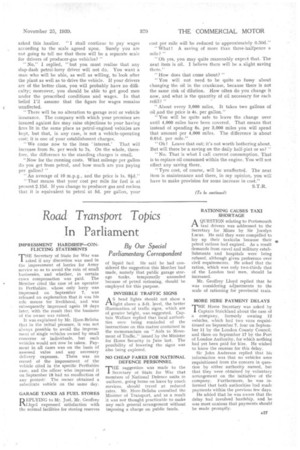Road Transport Topics
Page 37

If you've noticed an error in this article please click here to report it so we can fix it.
In Parliament
IMPRESSMENT HARDSHIP=CONFLICTING STATEMENTS
THE Secretary of State for War was asked if any discretion was used in the impressment of lorries for Army service so as to avoid the min of small businesies, and whether, in certain cases compensation was paid. The Member cited the case of an operator in Perthshire. whose only lorry was impressed on September 7, was released on explanation that it was his sole means for livelihood, and was subsequently impressed again 10 days later, with the result that the business of the owner was ruined.
It was explained by Mr. fore-Belisha that in the initial pressure, it was not always possible to avoid the impressment of single vehicles owned by small concerns or individuals, but such vehicles would not now be taken. Payment in all cases was on the basis of assessed value and any necessary delivery expenses. There was no record of the impressment of the vehicle cited in the specific Perthshire case, and the officer who impressed it on September 18 had no recollection of any protest: The owner obtained a substitute vehicle on the same day.
GARAGE TANKS AS FUEL STORES
REPLYING to Mr. Joel, Mr. Geoffrey Lloyd expressed satisfaction with the normal facilities for storing reserves
By Our Special Parliamentary Correspondent
of liquid fuel. He said he had considered the suggestion this Member had made, namely that public garage storage tanks, temporarily unneeded because of petrol rationing, should be employed for this purpose.
INVISIBLE TRAFFIC SIGNS
:A A S head lights should not show a
light above a 3-ft. level, the better illumination of traffic signs, which are of greater height, was suggested. Captain Wallace replied that local authorities were being reminded of the instructions on this matter contained in the memorandum on " Aids to Movement of Traffic," issued by the Minister for Home Security in June last. The possibility of lowering the signs was also being explored.
NO CHEAP FARES FOR NATIONAL DEFENCE PERSONNEL
THE suggestion was made to the Secretary of State for War that members of National Defence units in uniform, going home on leave by coach services, should travel at reduced rates. Mr. Hore-Belisha consulted the Minister of Transport, and as a result it was not thought practicable to make any such general arrangement without imposing a charge on public funds.
RATIONING CAUSES TAXI SHORTAGE
AQUESTION relating to Portsmouth taxi drivers was addressed. to the Secretary for Mines by Sir Jocelyn Lucas, He said they were compelled to lay up their taxicabs because their petrol rations had expired. As a result demands from naval and military establishments and hospitals were being refused, although given preference over civil requirements. He asked that the ration, which was only two-thirds that of the London taxi men, should be increased.
Mr. Geoffrey Lloyd replied that he was considering adjustments to the scale of rationing for provincial taxis.
MORE HIRE PAYMENT DELAYS
T" Home Secretary was asked by Captain Strickland about the case of a company, formerly owning 12 vehicles, which had two vans requisitioned on September 7, four on September 11 by the London County Council, and three on September .17 by the Port of London Authority, for which nothing had yet been paid for hire. He wished to know the reasons for this delay.
Sir John Anderson replied that his information was that no vehicles were requisitioned from the concern in question by either authority named, but that they were obtained by voluntary arrangement on the initiative of the company. Furthermore, he was informed that both authorities had made payments within the previous few days.
He added that he was aware that the delay had involved hardship, and he was most anxious that payments should be made promptly.






























































